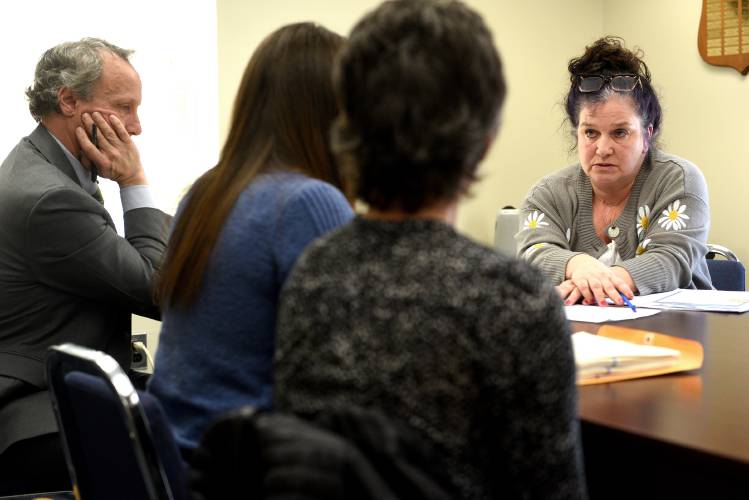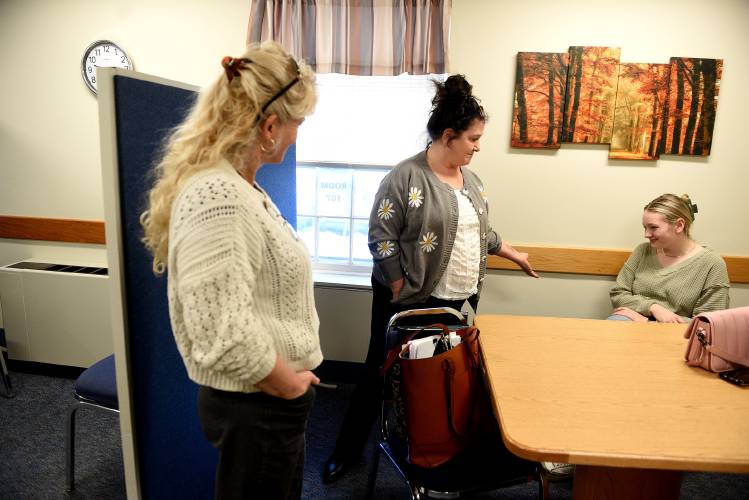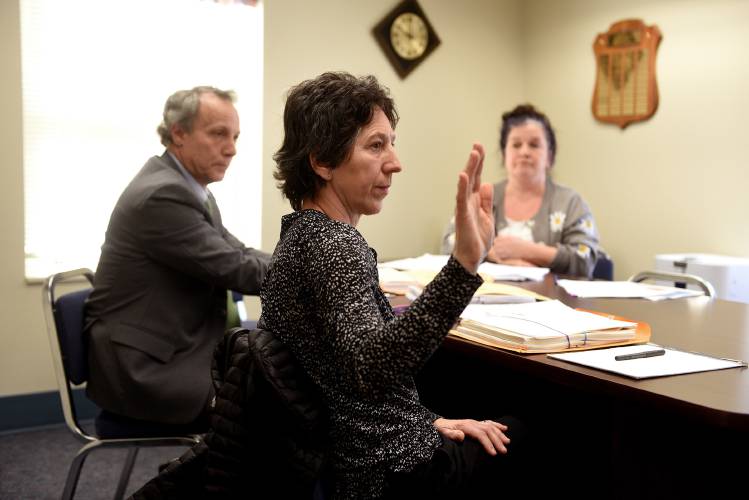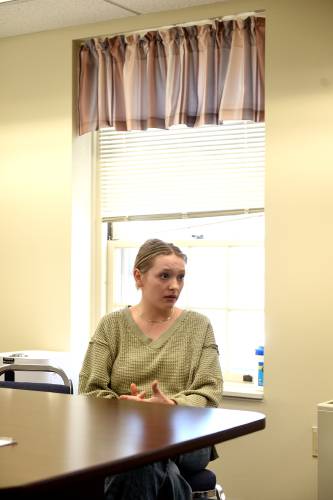Jim Kenyon: Three Tomatoes employees take tip-sharing case to state labor board
|
Published: 02-09-2024 9:31 PM
Modified: 02-14-2024 9:27 AM |
Jennifer Kahn is a school secretary by day and a server by night. Four afternoons a week, she leaves Mascoma Valley Regional High School after the final bell and drives to downtown Lebanon, where she works the dinner shift at Three Tomatoes Trattoria.
But before starting her shift, “I take a 10-minute power nap in my car,” the 59-year-old Kahn told me. “That’s really all I have time for.”
She’s worked at Three Tomatoes, which was originally called Sweet Tomatoes, since shortly after it opened in 1990.
Kahn, who raised her three children, mostly as a single mom, after divorcing in the early 2000s, has relied on the money earned waiting tables to help pay for everything from utility bills to her kids’ college educations. “It’s most of my income,” she said.
For Kahn, like most people who work as servers in restaurants, tips are her bread and butter. On a good night, she brings home $300.
But for many years, it should have been more.
Until recently, Three Tomatoes forced its servers before they left for the night to fork over a portion of their tips to bartenders, table bussers and some shift managers who seat customers.
In the restaurant world, it’s known as tip sharing or tip pooling.
Article continues after...
Yesterday's Most Read Articles
It’s also the reason why Three Tomatoes, one of the Upper Valley’s most popular restaurants, is up to its neck in marinara sauce at the moment.
Tip pooling — at least, the way Three Tomatoes went about it — is against the law in New Hampshire.
During a state Department of Labor investigation into the restaurant’s employment practices completed in November, Three Tomatoes General Manager Louise Clarke acknowledged the restaurant had a “mandatory tip sharing policy that servers must adhere to as a condition of employment.”
The state law pertaining to when a restaurant can withhold wages from an employee clearly makes that a no-no.
“Tips are wages and shall be the property of the employee receiving the tip and shall be retained by the employee, unless the employee voluntarily and without coercion from his or her employer agrees to participate in a tip pooling or tip sharing arrangement,” the law reads.
Which brings me back to Kahn.
Depending on the number of shifts she worked, Kahn said she was putting $100 to $125 a week into Three Tomatoes’ tip pool. Over the nearly 34 years that she’s worked at the restaurant, Kahn figures she contributed roughly $200,000 to the tip pool. (Remember, under New Hampshire law, tips are considered wages.)
Kahn is now trying to get back some of that money. On Tuesday, she argued her claim for unpaid wages before a hearing officer at the labor department in Concord.
Mandatory tip sharing has been unlawful in New Hampshire since 2007. State labor law only allows employees to go back three years in their claims. Otherwise Kahn could be arguing for six-figure settlement based on the 16 years the law has been on the books.
On top of being illegal, the tip sharing policy that Three Tomatoes forced upon its servers could hardly have been more convoluted.
At the end of each night, management used a summary of each server’s sales receipts to determine how much cash they had to throw into the tip pool.
Servers were required to “tip out” 6% of their beer, liquor and wine sales to the bartender. If a diner purchased a $50 bottle of wine, the server owed $3 to the bartender. A busser was entitled to 1.5% of sales. On a party of 10 that ran up $500 bill, the server owed $7.50 to the co-worker whose job it was to clear the table.
For that same table of 10, a server had to give $1.50 (15 cents per customer) to the shift manager who seated them.
Like other servers at the restaurant, Kahn had “no idea” that tip sharing was only legal if she agreed to it in advance, she said in an interview after the hearing.
“I just did what (management) told me to do,” she said.
What changed?
Kesia LaBreck, a 2008 Lebanon High School graduate, had worked as a server at Denny’s in West Lebanon for eight years before Three Tomatoes hired her in August 2021. At the chain diner, servers weren’t required to share tips but could do so voluntarily, which she did with co-workers who helped her out, LaBreck said.
At Three Tomatoes, however, she didn’t have a choice.
“There was something about having to tip a manager (for seating customers) that seemed off to me,” LaBreck said in an interview before Kahn called her as a witness at Tuesday’s hearing.
After joining Three Tomatoes’ staff, LaBreck started looking up New Hampshire labor laws online. Her research showed that Three Tomatoes was in the wrong.
She told Kahn and other servers about she’d learned. Servers brought up the issue with management, but it fell on deaf ears, they said.
LaBreck, 34, contacted the state labor department, which then notified Three Tomatoes in August that it would be conducting an audit of the restaurant’s pay records, bank statements and other financial records. A state inspector also planned to interview employees and review documents regarding tip sharing.
Clarke, the restaurant’s general manager, was “cooperative throughout this inspection process,” the inspector wrote in her final report.
Clarke has worked at Three Tomatoes since its early days and became a part-owner in 2021. Her son, Patrick Clarke, is a part-owner as well.
When she started searching for the restaurant’s documents regarding tip sharing, Clarke discovered “some of those records had been disposed of and no longer existed,” she told the inspector.
Under state law, employers must retain records of hours and wages for three years, but Clarke could only come up with paper documents for five months in 2023. On Tuesday, Clarke testified she had come to realize “the owner had done a cleaning job and had gotten rid of boxes” containing financial records kept in the restaurant’s storage area.
The labor department’s investigation lists Robert Meyers as the restaurant’s owner. Meyers didn’t attend Tuesday’s hearing. When I called the restaurant later, an employee said Meyers was “semi-retired” and referred me to Clarke.
Meyers hasn’t been at the restaurant for a while and she didn’t know when he’d return, Clarke told me. Along with Three Tomatoes in Lebanon, Meyers and a business partner owned restaurants with the same name in Williston, Vt., and Rutland that closed in 2014 and 2015, respectively.
According to the labor department’s inspection report, Three Tomatoes “failed to keep a true and accurate record of all payroll records.”
“Their absence makes it impossible to determine all wages known to be owed to employees and to complete a comprehensive wage adjustment,” the report stated.
In November, the labor department ordered Three Tomatoes to pay out a total of $20,387 in withheld wages to scores of current and former employees. The restaurant was also required to pay a $500 civil penalty.
While it could be argued that Three Tomatoes got off easy with the relatively small fine, Lexie Rojas, who heads the labor department’s inspection division, told me she considered this a “case of ignorance, not willfulness.”
On Tuesday, Clarke testified that “the Department of Labor opened our eyes. We realized we were wrong.”
After sending out the “wage adjustment” checks ordered by the state in November, Three Tomatoes recognized it still had more to do, Clarke said at the hearing.
Although the restaurant had paper documents for only five months in 2023, it used computer records to fill in some of the missing pieces from earlier years this decade.
A second batch of wage adjustment checks were issued last month. By mandating tip sharing, “obviously, we were wrong,” Clarke said, “and we’re making it right.”
The two checks to Kahn, who suffered the most in lost wages of any employee, total $10,434. “I think (Three Tomatoes’ management) thought it was going to satisfy me,” Kahn said.
If so, management thought wrong.
Both checks — one for $1,803 and the other for $8,631 — hang from the refrigerator door in the kitchen of Kahn’s home in Canaan.
She’s hesitant to cash them, fearing that if she does it will jeopardize her case with the labor department. After striking out trying to find an attorney to take her case at a fee she could afford, Kahn represented herself at Tuesday’s two-hour hearing.
Going by her records, Kahn figures that Three Tomatoes owes her $16,125 — $5,691 more than the restaurant has sent her in its two wage adjustment checks.
She’s also asking for liquidated damages and interest pays, both of which are allowed under state labor law. That brings her wage claim to $42,924 — or $32,490 more than the restaurant has sent her.
At Tuesday’s hearing, Lebanon attorney Brad Wilder, who represented Three Tomatoes, maintained Kahn’s case doesn’t merit liquidated damages because the restaurant didn’t intentionally break the law. “This was an unfortunate mistake,” he argued.
Timothy Fischer, the hearing officer in the case, has 30 days to make a ruling. The losing side can appeal to state Superior Court.
I’ve heard at least two other servers are pursuing wage claims. LaBreck and Annaleigh Lynch, who also testified on Kahn’s behalf, have hearings scheduled for later this month.
Kahn and Lynch still work at Three Tomatoes. LaBreck testified Tuesday that she was “let go” in December. LaBreck told me it was due to her bringing the tip sharing practices to light. (Before witnesses testified, Fischer reminded them that they could only talk about wage claim issues, preventing LaBreck from mentioning why she asserts that she lost her job.)
*
In 2023, due largely to the lobbying efforts of the restaurant industry, the tip sharing law was watered down by the Legislature.
“Previously, tip pooling or tip sharing arrangements were only valid under the law if requested by an employee,” states the labor department’s website.
But a change signed into law by Gov. Chris Sununu in July now permits employers to “discuss tip pooling or tip sharing provided they do not coerce employees into participating.”
It allows restaurant owners and managers to pitch tip sharing to servers as a way to show they’re team players.
If they decline to share tips, it’s not because they’re selfish, servers at Three Tomatoes told me. “I have no problem helping co-workers who help me,” Lynch said.
But having to tip a busser who clocks out early, leaving her to clear a table loaded with dirty plates and glasses? Or sharing tips with a bartender who doesn’t help her pull a bottle of wine off a shelf?
“It is upsetting to not have free will over where my money goes at the end of the night,” Lynch wrote in a statement to the labor department.
Lynch, a 2020 Hartford High School graduate, recently finished online classes at Southern New Hampshire University, earning a degree in business administration. “This is how I pay for college,” said Lynch, referring to her job at Three Tomatoes.
After the hearing, Wilder told me that tip sharing is a matter of fairness. Servers “benefit from the assistance of co-workers who never come in contact with the patrons,” he said.
For years, restaurants, in general, have used state and federal wage laws to their advantage. Restaurants are allowed to pay servers less than minimum wage — $7.25 an hour in New Hampshire — as long as servers can make up the difference through tips. Three Tomatoes’ servers are paid $5 an hour, and the rest of their income is derived from tips, Kahn said.
The bottom line: Tip pooling is a way for restaurants to keep down their labor costs at the expense of servers.
Restaurants get away with paying less than a living wage to bartenders and people who bus tables by relying on servers to subsidize their pay.
A few hours after the hearing ended in Concord, Kahn was back at Three Tomatoes for her regular Tuesday night dinner shift.
Kahn is an “incredibly hard worker,” Clarke testified. “I’m sorry we have to go through all off this.”
Maybe that was Clarke’s way of apologizing. But I’m not sure it matters much in a case that seems well beyond its tipping point.
Jim Kenyon can be reached at jkenyon@vnews.com.






 A Life: Richard Fabrizio ‘was not getting rich but was doing something that made him happy’
A Life: Richard Fabrizio ‘was not getting rich but was doing something that made him happy’ Herd departs Hartford’s last remaining dairy farm
Herd departs Hartford’s last remaining dairy farm 
